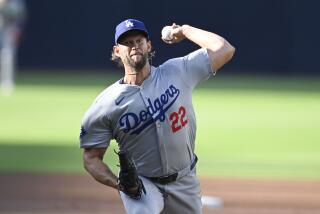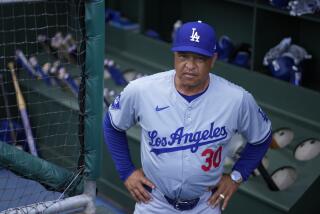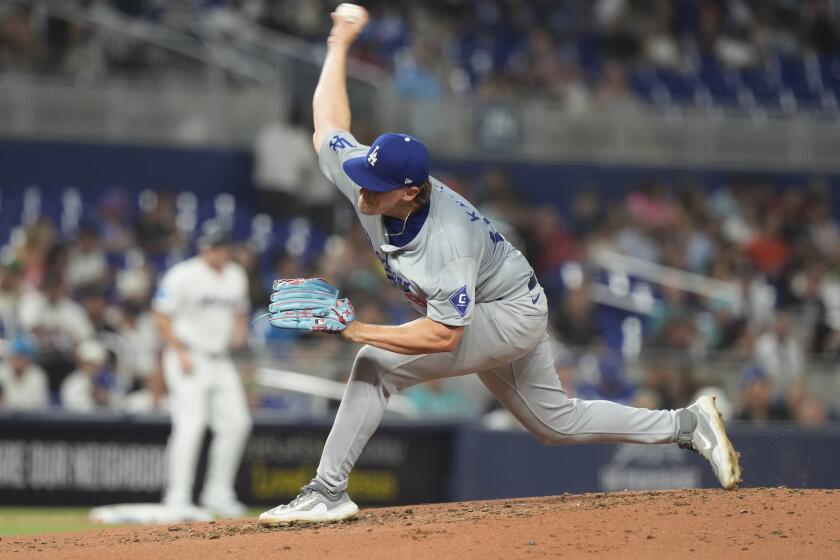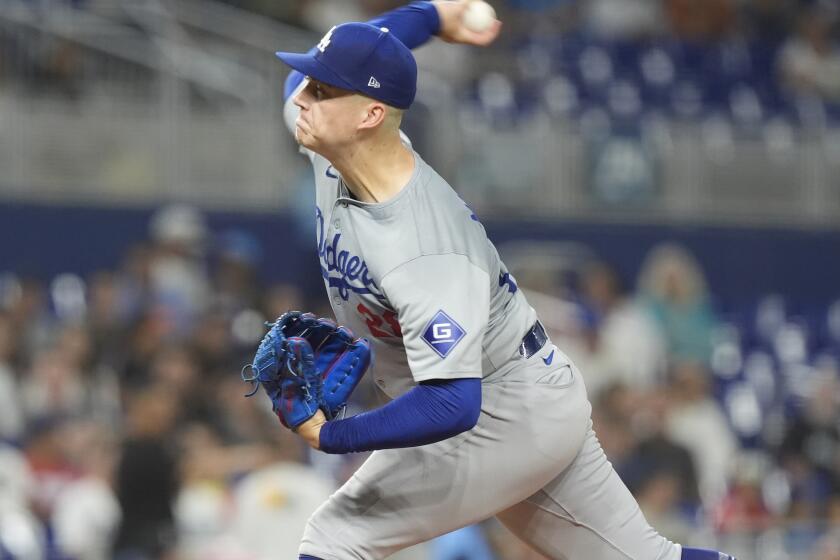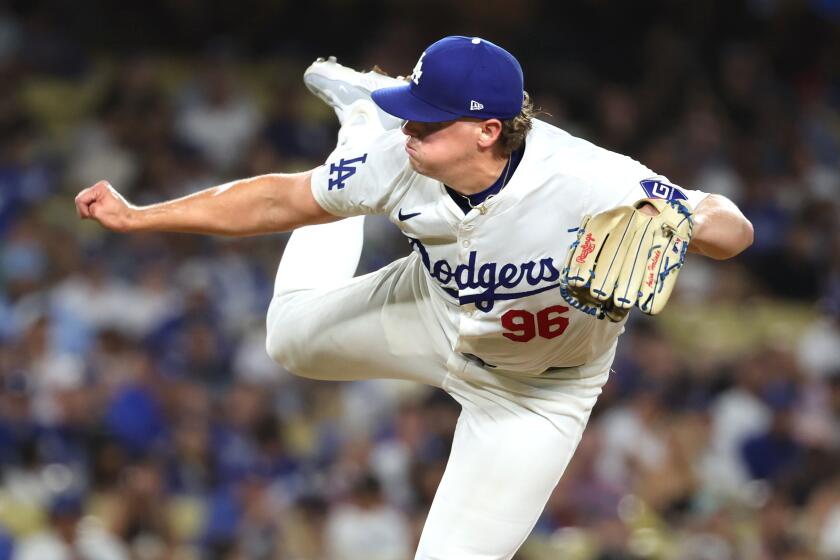How did Dodgers go from possibly the best of all time to, right now, the worst team in the majors?

The Dodgers have lost 15 of their last 16 games. (Sept. 12, 2017)
The first loss felt innocuous. On Aug. 26, a crisp, clear evening out at Chavez Ravine, there was no way Dodgers manager Dave Roberts could have foreseen the avalanche awaiting his team.
After getting shut out by the Milwaukee Brewers, Roberts wore a smile as he pulled up a chair at his postgame news conference.
“You’re going to have those nights,” he said. “We’ve got a good club.”
At that moment, the start of one of the worst stretches in franchise history, Roberts and the Dodgers stood atop the baseball world. The team had already won 91 games — the same number it won in all of 2016 — with a month remaining in the season. Their lead in the National League West was 20 games, and the primary concern was keeping the regulars fresh and settling the roster for an October playoff run.
The team entertained thoughts about making history: Challenging the major league record of 116 wins in the regular season, then snapping a 28-season World Series drought in October.
The best team in baseball. The sobriquet fit. Those were the 2017 Dodgers, the purported team of a lifetime, a group assembled by a high-powered front office, supported with the sport’s largest payroll, aided by strategic innovations, infused with a rare combination of stardom and depth, and imbued with a flair for the dramatic. No lead felt safe when the Dodgers came to the plate. Anything seemed possible.
Everything, except for what happened next. By losing 10 in a row and 15 of 16 heading into Monday night’s game at San Francisco, the Dodgers shattered the confidence of a fan base wary after four consecutive early playoff exits.
The pitchers have been pummeled. The offense has been silent. Yu Darvish and Curtis Granderson, the two stars acquired by president of baseball operations Andrew Friedman in July and August, have flopped. The losing has become constant, a counterpoint to a summer in which the team appeared incapable of it. And the Dodgers have three weeks to resurrect their morale.
With no answers in sight, fans have cast about for solutions. The explanations vary from the illogical (Roberts juggles his lineup too often) to the inconsequential (the arrival of Granderson hurt the team’s chemistry) to the supernatural (the team was cursed by a Sports Illustrated cover proclaiming “Best. Team. Ever?”).
The actual answer is something that cannot be solved by a ritual burning of a magazine or a campfire “Kumbaya” to build unity or a tough-love speech by a manager. The Dodgers have foundered because of diminished performances from the players they relied upon during their historic summer.
It’s past the point of anger and frustration now.
— Dodgers shortstop Corey Seager
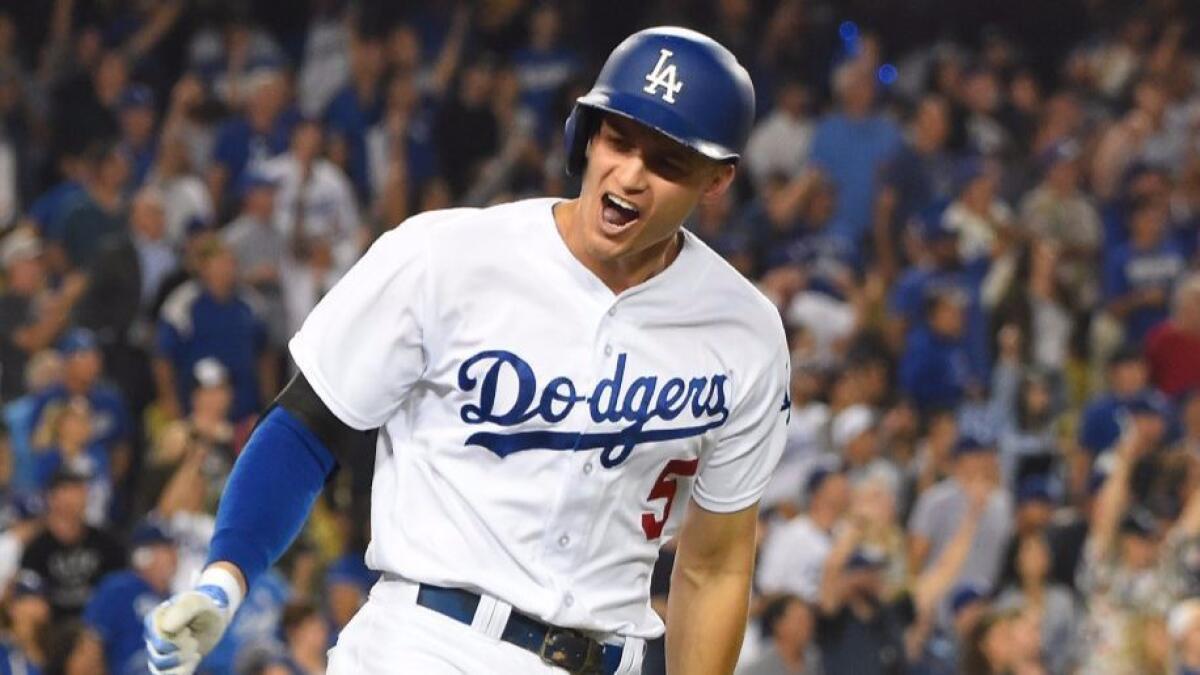
“It’s past the point of anger and frustration now,” All-Star shortstop Corey Seager said Sunday afternoon. “We have to go out and play better.”
The skid occurred in stages, building from a nuisance into a puzzle into a source of full-blown dread for fans and a source of lost sleep for team officials. Sometimes at night, Roberts joked over the weekend, he looks up at the ceiling and reminds himself what his team’s record is. He did not always sound this downtrodden.
After the fifth loss, on Aug. 31, which completed a three-game sweep by Arizona in Phoenix, Roberts offered perspective. The Dodgers had not experienced a three-game losing streak all summer. He was disappointed in his starting pitchers, but all teams, he reasoned, go through times like this. “We just have to turn the page,” he said.
After the eighth loss in nine games, Roberts looked resolute. The Dodgers had dropped three of four to the woeful San Diego Padres, but the manager crossed his arms and declined to overreact. “I can assure you, this won’t break us,” he said.
After the 12th loss in 13 games, Roberts bumped into a reporter outside the clubhouse at Dodger Stadium. The losing had gotten so contagious, even ace Clayton Kershaw was affected. Following another sweep by Arizona, Kershaw got pummeled by Colorado. “I’ve never seen anything like this,” Roberts said.
After the 15th loss, a trouncing on Sunday afternoon by the Rockies, Roberts struggled to maintain optimism. His offense had been moribund for two weeks. He mentioned the anger of his players, an emotion that was incongruous compared to his team’s listless play. Roberts was asked whether he felt there was anything he personally could do to stop the losing. “I don’t know,” Roberts said. “I’m open to suggestions.”
By then, the Dodgers had made history. Their 10-game losing streak matched the longest in Los Angeles Dodgers history, equaled only by the 1961 and the 1987 teams. Neither of those clubs reached the playoffs; these Dodgers still hold the best record in baseball, and still have home-field advantage in the playoffs.
A miserable regular-season finish does not foretell doom. In the last 20 seasons, five teams have posted a losing record in September and won the World Series. Yet no baseball team has ever gone through a 1-13 stretch and won it all, according to STATS LLC. The Dodgers reached that ignominious marker three losses ago.
How did this happen? How did this juggernaut transform into a group All-Star third baseman Justin Turner called “the worst team in baseball”?
It started with the pitchers. During a three-game series in Arizona on Aug. 29-31, the trio of Rich Hill, Hyun-Jin Ryu and Kenta Maeda surrendered 19 runs. In the last two weeks, the starting rotation has posted a 6.88 earned-run average — the worst in the National League, and well below their season ERA of 3.48.
The Dodgers had been counting on Darvish, acquired from the Texas Rangers, and Alex Wood to be playoff starters with Kershaw. While tinkering with his delivery, Darvish has a 5.34 ERA as a Dodger. Roberts has started praising him for generating soft contact — giving up only weak hits. That’s the way managers typically talk when supporting rookies and journeyman. But Darvish is a four-time All-Star who struck out 1,000 batters faster than any other player in major league history. The Dodgers are still waiting to see that pitcher.
Wood, who was chosen an All-Star after his strong start to the season, has seen his fastball velocity decrease. He gave up two home runs in the first half; he has allowed 11 since the All-Star break. Wood could be shifted to the bullpen for the playoffs.
What we did three months ago doesn’t mean a whole lot right now.
— Dodgers third baseman Justin Turner
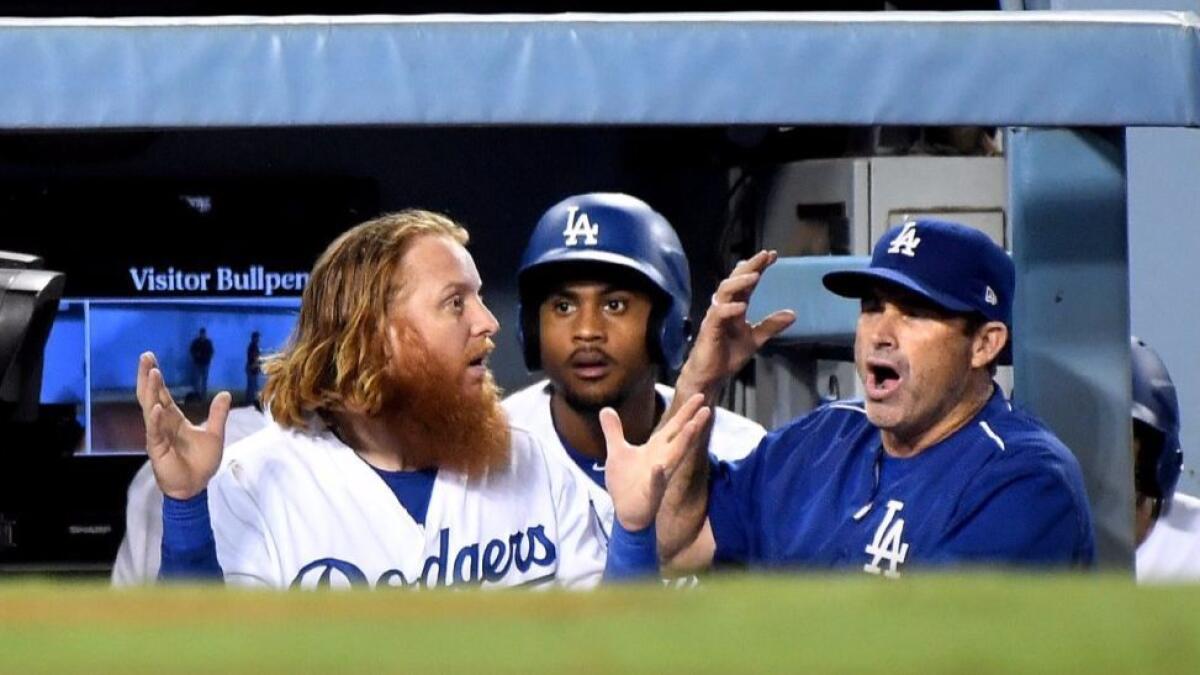
When the starters faltered earlier in the season, the offense was there to pick them up. But the bats have gone cold. Heading into Monday, the Dodgers owned the lowest on-base-plus-slugging percentage in the majors over the last two weeks. In part, they were penalized for their caution with Seager.
The shortstop, last season’s NL rookie of the year, has dealt with inflammation in his throwing elbow for weeks. The organization decided to shut him down for 11 games to rest his arm. The decision felt sensible when the Dodgers led the division by 20 games. But the offense struggled to compensate for Seager’s absence.
Despite the team’s depth, the four primary generators of offense in the lineup are Seager, Turner, rookie All-Star Cody Bellinger and utility man Chris Taylor. Turner’s bat has cooled off: He hit .377 in the first half, and .264 thus far in the second. Bellinger has continued to slug at an impressive clip — his 36 home runs rank second in the NL — but has produced only two multiple-hit games since Aug. 13, a stretch during which he sat out nine games because of an ankle sprain. Taylor has hit .269 since Aug. 1.
“What we did three months ago doesn’t mean a whole lot right now,” Turner said.
With the stars waning, the others have not stepped up. Granderson was batting .114 as a Dodger heading into Monday, unable to avoid strikeouts and incapable of producing power. Second baseman Logan Forsythe had hit .143 these past two weeks, catcher Yasmani Grandal had hit .176 and outfielder Yasiel Puig had hit .231.
When this streak began, the Dodgers still considered themselves the best team in the sport. Their goal was the ultimate. After this stretch, the loftiness of their ambition has decreased diminished.
“We have to find a way,” Roberts said Sunday, “to win a game.”
Twitter: @McCulloughTimes
More to Read
Are you a true-blue fan?
Get our Dodgers Dugout newsletter for insights, news and much more.
You may occasionally receive promotional content from the Los Angeles Times.
